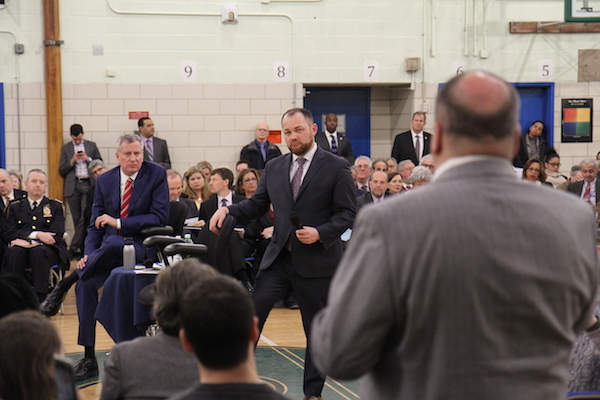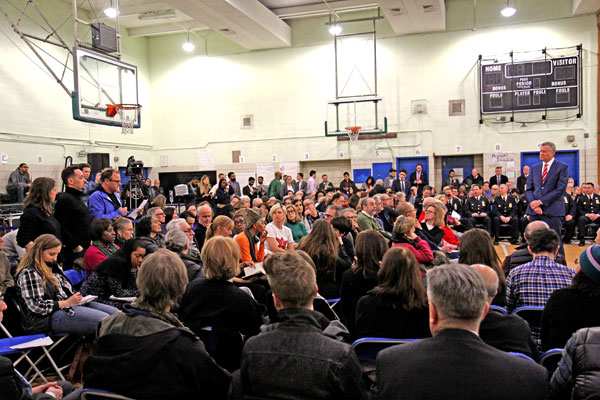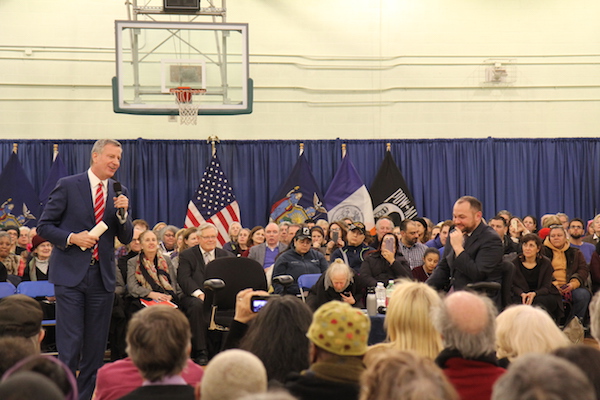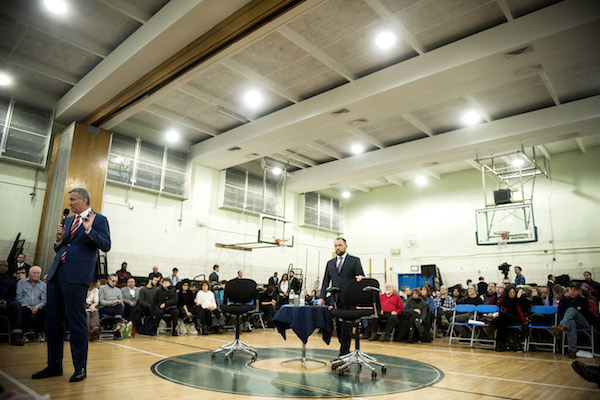
BY DENNIS LYNCH | Mayor Bill de Blasio answered dozens of questions from New Yorkers during a March 15 town hall co-sponsored by Community Boards 2, 4, 5 and 7, and moderated by City Councilmember Corey Johnson. Held at the NYC Lab High School for Collaborative Studies on W. 17th St., the nearly three-hour event (two of them dedicated to Q&A) saw its capacity crowd press their mayor on topics as local as excessive horn honking (on the corner of W. 23rd St. & Eighth Ave.) and as national as the need to confront President Trump on his immigration policy.
De Blasio brought along commissioners and deputy commissioners from city agencies, and often deferred to them when answering questions. At one point, the mayor gave a quick nod to the attending former State Senator Tom Duane, a man he called a “legend” in Albany and the local community. Duane’s successor, Brad Hoylman, was among the group of electeds credited with presenting the event (including Manhattan Borough President Gale Brewer, who was in attendance).
Miguel Acevedo, president of the Fulton Houses Tenants’ Association, kicked off the town hall with a question about a city-community agreement to help minority and women-owned business enterprises (M/WBE) open in Hudson Yards. Acevedo said the city has failed to do so.
De Blasio spoke broadly about the M/WBE program. “We are constantly pushing the private sector to commit resources to women- and minority-owned businesses,” he said, then deferred to Department of Small Business Services commissioner Gregg Bishop, who said that his agency was working to organize job fairs for jobs at Hudson Yards, and is making sure that Related Companies, which developed Hudson Yards, is “aware of the companies certified with us for future opportunities” there.
Both de Blasio and Johnson frequently asked people to do more to help flip the state Senate Democratic, citing the Republican-controlled body as a major roadblock for many of the policies the Democratic-controlled City Council wants to make law.
Answering a question about “underfunding” at public schools, de Blasio said “we need to fight harder” for state funding, and as long as current funding remains steady “we will hit 100 percent fair funding for every school by 2021.” Johnson followed him and said that “we have to turn the state Senate Democratic” if the city wants to better secure school funding, among other things.
Some may be dismayed to learn Mayor de Blasio “is not there yet” on congestion pricing, a scheme in which drivers are charged more money for being in a certain area, such as on the island of Manhattan. He’s not convinced it’s the way to approach traffic issues and is convinced it wouldn’t pass through the Albany legislatures.
When asked broadly about the city “getting out from under the yoke of Albany,” de Blasio said the first thing he would do is “strengthen rent regulation.”
A woman later on asked the mayor about helping small businesses stay in operation in the face of skyrocketing rents. Johnson said commercial rent regulation, which has been proposed in the city for years via the Small Business Jobs Survival Act (SBJSA), can’t happen without Albany’s support.
“It’s never going to happen, because of Albany. Let’s turn the state Senate Democratic and then talk about all the wonderful things we want to do in the world,” he said.

At the beginning of the town hall, the mayor plugged his plan to consolidate homeless shelter beds from hundreds of hotels and apartments into 90 city-designated shelters, but no one asked him about the plan. Councilmember Johnson is a co-sponsor on legislation that seems at odds with that plan, which seeks to site shelters in communities from which people enter the shelter system. The Council legislation looks to spread them more “equitably” around the city.
De Blasio announced that the much-maligned Aladdin Hotel shelter at 317 W. 45th St. (btw. Eighth & Ninth Aves.), in operation since 2002, would be closed as a part of his five-year plan. The mayor said he was “adamant” about closing the shelter, but said it would “take time” to do so.
“From time to time, we still may need to go into some new hotels when there is a particular need or crisis, but the goal is to get out of hotels, to get out of cluster apartments, which have not been a decent standard of living for people,” de Blasio said.
Education issues came up a few times. A public school teacher asked de Blasio about ensuring immigrant children feel safe in school. The mayor said that he and Department of Education Chancellor Carmen Fariña have told parents and students “that they are respected and protected regardless of their origins, regardless of their immigration status, and that when they come to their school they are in someplace safe and that no information will ever be shared with the federal authorities.”
A parent asked de Blasio if he was doing anything to decrease school size and to counter the policies that may hurt public schools that many expect out of President Trump’s Secretary of Education Betsy DeVos’s department.
“We’re never going to go to vouchers,” de Blasio said, speaking of publicly funded grants for students to attend private schools.
De Blasio said that budget issues, a growing population, and severe overcrowding elsewhere in the city “does not allow us to do as much as we want to on class size.” School Construction Authority CEO Lorraine Grillo listed some local projects including the new middle school at 75 Morton St. in the West Village, and two sites “near New York University” and Hudson Square they are “debating.”
A West Village Houses co-op owner asked the mayor to help work out a better deal than the city first gave owners to keep the cooperative affordable. The mayor said “I tend to think we can find our way to something good,” and a Department of Housing Preservation and Development (HPD) representative said that her department “would very much like” to work something out. Johnson said that he was willing to broker a meeting and reiterated to the HPD rep that the folks at West Village Houses “were not happy with the HPD offer.”
The mayor also answered some questions regarding public housing. Elliott-Chelsea Houses tenants heard that the city was pushing a new preventative program to exterminate rats at the complex. More broadly, de Blasio said he would fight federal cuts to the Department of Housing and Urban Development (HUD) to hopefully maintain some funding for the New York City Housing Authority (NYCHA).
Answering a broader question about the city’s sanctuary policies, de Blasio said that the city would provide legal assistance to individuals the city sees as wrongly threatened with deportation.

Trump’s proposed budget came up again later in the town hall, although city administrators stressed that the budget was far from final and didn’t get into many specifics. A woman asked how the city’s Department of Environmental Protection (DEP) would step up to fill the role of the federal Environmental Protection Agency (EPA). Trump wants to slash the EPA’s funding by $2.4 billion, or more than a quarter of its current $8.1 billion budget.
“We cannot do everything the EPA does; I think that’s the sad truth. We can use all our powers and work with the state… if we see there is some gap we can legally act on,” de Blasio said.
De Blasio also advocated for his “mansion tax” — a 2.5 percent tax on the sale of homes $2 million or higher. The city’s Office of Management and Budget estimates it could net $336 million in the fiscal years 2018, according to the New York Post. That tax would come on top of a 1 percent tax levied by the state since the late 1980s on home sales of $1 million or more.
Many locals pushed de Blasio about land use.
Community Board 4 (CB4) Clinton/Hell’s Kitchen Land Use committee Chairperson Jean-Daniel Noland asked the mayor personally for help bringing affordable housing to the district, and got some good news about two sites in the district. The city has worked out “very close” to 100 percent affordable or completely affordable housing at the Slaughterhouse Site on 11th Ave. (btw. W. 39th & 40th Sts.) and will soon designate a developer for the site. HPD Deputy Commissioner Molly Park also announced that her department would issue a Request for Proposals (RFP) for two affordable sites at Hudson Yards in the late spring or early summer.
Fern Luskin asked de Blasio to create a liaison between the Department of Buildings (DOB) and the Landmarks Preservation Commission (LPC) in order to prevent historic buildings from being “defaced.” Luskin and others have spent years determined to halt further alterations (and reverse a fifth floor addition) to the Hopper-Gibbons House, a 339 W. 29th St. structure with well-documented links to the Underground Railroad and the 1863 Draft Riots.
“Yes, look, I appreciate the question exactly,” de Blasio said. “When we have come to the determination that something deserves landmark status we have to make sure actions are not taken to undermine that landmark.”
There seemed to be a misunderstanding with a DOB Commissioner, Rick Chandler, during the discussion — and Councilmember Johnson had to clear up that the Hopper-Gibbons House was indeed a landmarked building and was illegally altered.
De Blasio asked Chandler if there were any enforcement options still available with which to go after the owner, and Chandler said he would have an answer to Johnson by Thursday.
Chandler was put back in the hot seat later in the town hall when asked about bad actor landlords who misrepresent the status of their buildings to obtain demolition permits to scare off rent-regulated tenants, which in some cases can be a felony. Many people in Chelsea and Hell’s Kitchen believe the DOB has failed to properly enforce its rules in the neighborhood.
Chandler said he would “love nothing more than to get an owner on a felony if I could,” and that he was working to remedy loopholes in DOB permit applications that could allow landlords to misrepresent their buildings. De Blasio added that his administration was hiring more inspectors to help enforce rules.

Bad actors came up again at the end of the town hall, in reference to a number of addresses CB4 shared with the city that concern them. Chandler mentioned some Stop Work Orders, although de Blasio pushed for a more straightforward answer.
“Let’s be tight — it [work] stays frozen until there is a resolution that we believe is the proper resolution,” de Blasio told Chandler.

































